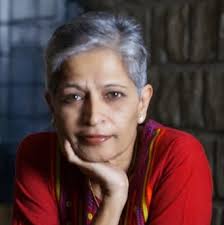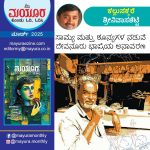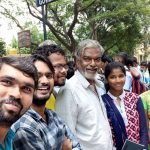Awesome foursome under a peepal tree – By: Gauri Lankesh
[Column by Gauri Lankesh for Bangalore Mirror, August 25, 2015, based on Mahadeva’s speech held at Davangere on August 15 and 16, 2015. ದಾವಣಗೆರೆಯಲ್ಲಿ2015 ಆಗಸ್ಟ್ 15 ಮತ್ತು 16ರಂದು ನಡೆದ “ಸಮಾನ ಮನಸ್ಕ ಸಾಮಾಜಿಕ ಕಾರ್ಯಕರ್ತರ ಚಿಂತನಾ ಸಮಾವೇಶ”ದಲ್ಲಿ ಮಹಾದೇವ ಅವರು ಆಡಿದ ಮಾತುಗಳನ್ನು ಆಧರಿಸಿ ಗೌರಿ ಲಂಕೇಶ್ ಅವರು ಆಗಸ್ಟ್ 25, 2015,ರ ಬೆಂಗಳೂರು ಮಿರರ್ ಪತ್ರಿಕೆಗೆ ಬರೆದ ಅಂಕಣ]
Bangalore Mirror Bureau | Aug 25, 2015,]

Devanur Mahadeva, revered Kannada writer and social critic, often expresses his thoughts in the form of metaphors. It was no different when he shared his ‘anxieties’ recently at Davanagere. Addressing Gandhians, Lohiaites, Ambedkarvaadis, Marxists, etc., who had gathered together to find ways of putting up a united peoples’ struggle, Mahadeva warned about the dangers of sticking to various ‘ism’s without grasping the spirit of the ideology. In order to illustrate his point, he narrated what he called a ‘Chandamama’ story. It went like this:”In one town there was a brook. In order to cross the brook, there was a slab of stone. Everyone used to step on the slab to cross from one side to another.
One day, when one man crossed the brook, he turned back and noticed that there was an image of a Devi on the slab. He apologised to the stone for having stepped on it and turned back to go on his way, but he felt that someone was holding on to his legs so tightly that he could not step forward. When he looked back, he noticed that the Devi on the stone had appeared before him. She told him, ‘Hey, how dare you try to escape from me without building me a temple?’ This should not become our story. We should follow our ideologies to move forward, not to turn them into objects of worship. If we start worshiping ideologies, we will have to build them temples, perhaps even shed blood.”
These days, Gandhians brook no criticism against the father of the nation. Likewise, Ambedkar-vaadis never miss an opportunity to disparage Gandhi. If Lohiaites scoff at Karl Marx, Marxists sneer at Ram Manohar Lohia. Well aware of this trend, Mahadeva warned “We have to possess the essence of Gandhi, Ambedkar, Karl Marx and Lohia; we have to get their pulse in order to ensure that we live as a harmonious, self-reliant and equal society.”
But how can one bring together all these different streams of ideologies? Mahadeva had a suggestion. “Let us imagine that all these four people are sitting together under a peepal tree and discussing issues which concern us today.
Recently, prior to his visit to China, the Indian Prime Minister slashed import tax on silk to ten per cent. As a result of that, the rate of silk in India crashed. Many mulberry farmers and cocoon growers committed suicide. If those four people under the peepal tree were to discuss this, what would they say? Perhaps they would say, ‘In our times, such things would not happen. If one king was paying a visit to another kingdom, he would take along with him some silk cloth to gift as a memento.’ In this background, when we analyse the Prime Minister’s visit, does it not become clear that in order to impress the head of China, he took with him not silk cloth but the heads of silk farmers as gifts? Similarly, we must ask the four to discuss WTO, GATT, subsidy policy, import tax, etc., in order to understand the issues of our time.”
If such a discussion were to take place, what kind of suggestions could they come up with? Marx might give the example of Cuba and talk about the benefits of organic farming – both for the advantage of the economy and the health of the populace. Gandhi might cite the achievements of Anna Hazare in Ralegan Siddhi. He might even say ‘Go to Kuthambakkam village in Tamil Nadu and see how its gram panchayat president Ilango Rangaswamy has transformed it into a self-reliant and secular place’ imagined Mahadeva, suggesting that there are answers around us if we look closely enough.
Mahadeva is not without a sense of humour. His intense talk was peppered with one funny aside. He said “What would the foursome’s reaction be to the increasing ‘caste townships’ across the country? Marx might say ‘What nonsense? They should be bombed.’ Gandhi might add a caveat and say ‘but make sure there is no harm to lives.’ Hearing this, Marx might smile at Gandhi. Before their conversation could end, perhaps Lohia and Ambedkar would have finished carrying out that venture. Just as Ambedkar had said ‘inter-caste marriages should be encouraged’ in order to annihilate caste, Marx might say ‘Let international marriages increase’. Upon hearing this, Lohia might start a conversation about love and passion with Marx. But, of course, out of the earshot of Gandhi and Ambedkar!”
In Mahadeva’s imagination, the foursome would certainly discuss the ongoing economic crisis in Greece. “They will take note of capitalists taking away the money they have so far looted in Greece. India is not bereft of greedy investors. So they might warn us to keep an eye on them. But what I am afraid of is what if the foursome turns around and asks us: ‘What held you back from stopping the indiscriminate exploitation of natural resources? Why did you not make sure that the money from such resources was used for public benefit such as free and universal education, health care, improving ground water resources, etc.? What stopped you?’ What will be our answer?”
Mahadeva rounded it up by saying “Gandhi had said ‘No one can cheat mankind as much as we cheat ourselves’. If we understand the true meaning of the line and find ourselves in those words, the world will open up to us and we will be able to connect with everything around us. That will also give us the words we need to speak and show us the path we need to tread. That is what is needed of us now.”
As always, Mahadeva provided inspiring metaphors. Sadly, we as a society are still a long way off from learning to interpret Gandhi, Marx, Ambedkar and Lohia through one another to make that awesome foursome a reality.
[The author is an activist-journalist]







